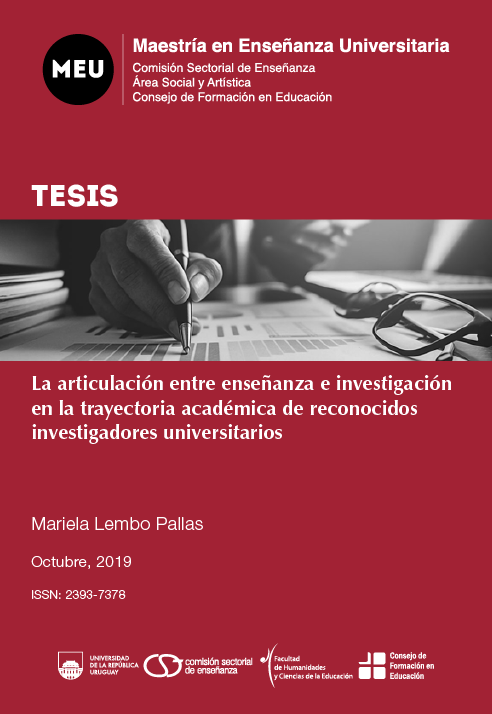Resumen
La indisociabilidad entre enseñanza e investigación es un valor tácito y universalmente aceptado en el contexto de la educación superior. Estas funciones están entre las que figuran en el artículo 2 de la Ley Orgánica de la Universidad de la República (1958). La presente tesis es un estudio sobre la pertinencia y la naturaleza de dicha relación, pretende describir los ejes conflictivos que la interfieren u obstaculizan. Se pretende asimismo arrojar luz sobre algunos aspectos de orden subjetivo, vinculados a cómo se origina la vocación de docentes – investigadores de la Universidad de la República, cómo fueron configurando su particular relación con el saber, con su creatividad, con sus mentores, con sus pares y con sus alumnos. Es en este matiz donde reside la originalidad del presente trabajo. El mismo responde a un enfoque hermenéutico que se sustenta en un marco teórico psicoanalítico. Se hace foco en la dimensión subjetiva, tanto de los procesos de aprendizaje como de los factores que participan y condicionan la elección de una vocación signada por la investigación académica que -a diferencia de lo que podría creerse- convive con un marcado deseo de enseñar. La creatividad aparece muy realzada en los entrevistados en ambas funciones, pero incluso en otras esferas -distintas a la de su campo de estudio- en las cuales también tienden a ser exploradores e innovadores. Evocan modelos identificatorios que los marcaron fuertemente por la forma de entablar una relación con el saber en la que no se posicionaron en el lugar de expertos. El tener la oportunidad de confrontar sus ideas con ellos jugó un rol importante en el desarrollo de sus conocimientos. Sus discursos refieren a dos tipos de saberes distintos: los que caducan (propios de la función investigación) y los perennes (atribuibles a la función enseñanza) que tienden a entremezclarse en una zona compartida que es la forma en que los entrevistados conciben su práctica educativa. El ejercicio de la docencia “en modo de investigación” se encuentra más próximo a la transmisión de interrogantes cuyo objetivo es la propagación del saber creado por el propio docente – investigador y/o de las herramientas necesarias para perseguirlo (aunque no necesariamente conseguirlo). Este tipo de actividad la oponen a la “docencia de información” que vinculan más específicamente a la transmisión de enunciados -conocimientos-. Estas distinciones conceptuales constituyen uno de los hallazgos emergentes de esta investigación.
Palabras claves
investigación, enseñanza, educación superior
Abstract
The indissociability between teaching and research is a tacit and universally accepted value in the context of higher education. These functions are among those listed in article 2 of the Organic Law of “Universidad de la República” (1958). This thesis is a study on the relevance and nature of this relationship, it also aims to describe the conflicting axes that interfere or hinder it. Besides the objectives above mentioned, this study will also shed light on some subjective aspects, linked to how the vocation of teachers – researchers from the “Universidad de la República” originates, how they shaped their particular/personal relationship with knowledge, with their creativity, with their mentors, with their peers and with their students. It is in this particular aspect that the originality of this work resides. It responds to a hermeneutical approach that is based on a psychoanalytic theoretical framework. It focuses on the subjective dimension, both of the learning processes and the factors that participate and condition the choice of a vocation marked by academic research that -unlike what might be believed- coexists with a strong desire to teach. Creativity appears very enhanced in the interviewees in both functions, but even in other spheres –different from their field of study- in which they also tend to be explorers and innovators. They evoked identificatory models that marked them strongly in the way they established a relation with knowledge, where they were not positioned in the place of experts. Having the opportunity to confront their ideas with them played an important role in the development of their knowledge. As regards discourse, they refer to two different types of knowledge: those that expire (characteristic of the research function) and perennial (attributable to the teaching function) that tend to intermingle in a shared area, which is the way the interviewees conceive their educational practice. Teaching «in research mode» is closer to the transmission of queries, whose objective is the propagation of knowledge created by the teacher – researcher and / or the necessary tools to pursue it (although not necessarily achieve it). This type of activity is opposed to «teaching of information» that is linked more specifically to the transmission of statements -knowledge-. These conceptual distinctions constitute one of the emerging findings of this research.
Keywords
research, teaching, higher education
Director(es) de tesis
- Alicia Kachinovsky
Tribunal
- Mercedes Collazo
- Adriana Cristóforo
- Lidia Fernández
Fecha de Aprobación
04/10/2019
Dictamen
Excelente



